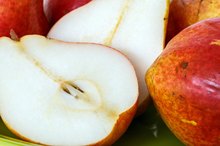The grapefruit is a hybrid citrus fruit developed in the 19th century in the Caribbean islands. In 1929, A. E. Henninger developed the ruby red grapefruit variety in Texas. The ruby red grapefruit's flesh is deep red and the peel is yellow with a pink blush overtone. The juice of the ruby red grapefruit provides a variety of nutritional benefits 2.
Vitamin C
The vitamin C content in 8 oz. of juice is 94 mg, or 157 percent of the daily 60 mg the FDA recommends. Vitamin C stimulates the production of white blood cells in the immune system to prevent the development of infections. The body also needs vitamin C to absorb and utilize iron necessary for the oxygenation of the cells.
- The vitamin C content in 8 oz.
- Vitamin C stimulates the production of white blood cells in the immune system to prevent the development of infections.
Vitamin A
What Are the Health Benefits of Drinking Pineapple Juice?
Learn More
A 1-cup serving of ruby red grapefruit juice provides 1,087 IU of vitamin A, or 22 percent of the daily 5,000 IU the FDA recommends. Vitamin A supports the regulation of the male and female reproductive systems. It also supports the health of the mucosal layer in the sinus cavities and intestines that prevents harmful pathogens from entering and causing infections.
Potassium
The potassium content in one cup of grapefruit juice is 400 mg, or 11 percent of the 3,500 mg FDA daily value. Potassium is a mineral the body needs to balance fluid. A high sodium level in the body increases the potassium requirement, or high blood pressure can result. An estimated 95 percent of men and 75 percent of women consume more sodium than the 2,300 mg daily requirement. Researchers at the Loyola University Health System recommend consuming 4,700 mg of potassium daily to lower abnormally high blood pressure. Consult a physician prior to using potassium to regulate blood pressure.
- The potassium content in one cup of grapefruit juice is 400 mg, or 11 percent of the 3,500 mg FDA daily value.
- Researchers at the Loyola University Health System recommend consuming 4,700 mg of potassium daily to lower abnormally high blood pressure.
Calories
Foods High in Vitamin P
Learn More
A 1-cup serving of ruby red grapefruit juice contains 96 calories, or about 5 percent of the standard 2,000-calorie diet. The calorie content in cola and cranberry juice is about 50 percent higher. Ruby red grapefruit juice is a nutritious and flavorful beverage that provides refreshment when mixed with carbonated water or chilled on ice.
Related Articles
References
- University of Texas; Texas Citrus and Subtropical Fruits; Julian W. Sauls; December 1998
- USDA: Nutrient Data Laboratory: Grapefruit Juice, Pink, Raw
- "Medical News Today"; Cutting Salt Isn't The Only Way To Reduce Blood Pressure; January 27, 2009
- Grapefruit, raw, pink and red, all areas. USDA FoodData Central. Updated April 2019.
- Vitamin C - Fact Sheet for Health Professionals. National Institutes of Health (NIH). Office Of Dietary Supplements. Updated July 2019
- Chow O, Barbul A. Immunonutrition: Role in wound healing and tissue regeneration. Adv Wound Care (New Rochelle). 2014;3(1):46–53. doi:10.1089/wound.2012.0415
- Vitamin A Fact Sheet for Professionals. National Institutes of Health Office of Dietary Supplements. February 14, 2020
- Rasmussen HM, Johnson EJ. Nutrients for the aging eye. Clin Interv Aging. 2013;8:741–748. doi:10.2147/CIA.S45399
- Chen P, Zhang W, Wang X, Zhao K, Negi D, Zhou L, et al. Lycopene and risk of prostate cancer: A systematic review and meta-analysis. Medicine (Baltimore). 2015;94(33):e1260. doi:10.1097/MD.0000000000001260
- Vissers MCM, Das AB. Potential mechanisms of action for vitamin C in cancer: Reviewing the evidence. Front Physiol. 2018;9:809. doi:10.3389/fphys.2018.00809
- Dow CA, Going SB, Chow H-HS, Patil BS, Thomson CA. The effects of daily consumption of grapefruit on body weight, lipids, and blood pressure in healthy, overweight adults. Metabolism. 2012;61(7):1026-1035. doi:10.1016/j.metabol.2011.12.004
- Zhao CN, Meng X, Li Y, et al. Fruits for prevention and treatment of cardiovascular diseases. Nutrients. 2017;9(6):598. doi:10.3390/nu9060598
- Panche AN, Diwan AD, Chandra SR. Flavonoids: An overview. J Nutr Sci. 2016;5:e47. doi:10.1017/jns.2016.41
- Bourrier T, Pereira C. Allergy to citrus juice. Clin Transl Allergy. 2013;3(Suppl 3):P153. Published 2013 Jul 25. doi:10.1186/2045-7022-3-S3-P153
- Grapefruit Juice and Some Drugs Don't Mix. U.S. Food and Drug Administration. FDA Consumer Updates. Updated July 2017.
- Grapefruit juice and statins. Harvard Medical School - Healthbeat. Harvard Health Publishing. Updated September 2019.
- Bailey DG, Dresser G, Arnold JM. Grapefruit-medication interactions: Forbidden fruit or avoidable consequences?. CMAJ. 2013;185(4):309-16. doi:10.1503/cmaj.120951
- Kanellis A, Manganaris G. Fruit Ripening. (Nath P, Bouzayen M, Mattoo A, Pech J, eds.). Oxfordshire: CABI; 2014:110.
- Wanlapa S, Wachirasiri K, Sithisam-ang D, Suwannatup T. Potential of selected tropical fruit peels as dietary fiber in functional foods. International Journal of Food Properties. 2015;18(6):1306-1316. doi:10.1080/10942912.2010.535187
- Murphy MM, Barraj LM, Rampersaud GC. Consumption of grapefruit is associated with higher nutrient intakes and diet quality among adults, and more favorable anthropometrics in women, NHANES 2003-2008. Food Nutr Res. 2014;58:10.3402/fnr.v58.22179. doi:10.3402/fnr.v58.22179
Writer Bio
Based in Richmond, Va., Tara Carson has written articles for editorial and corporate online and print publications for more than 10 years. She has experience as an adjunct professor of nutrition at Northwest Christian University and holds a Bachelor of Science in journalism and nutrition from Virginia Commonwealth University.









